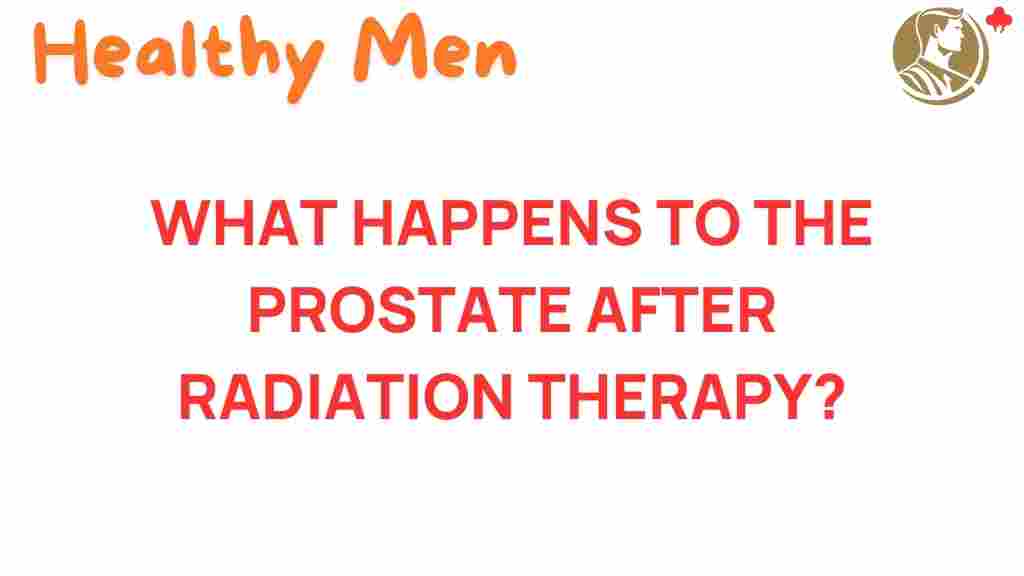Prostate Health: Understanding the Aftermath of Radiation Therapy
Radiation therapy is a common treatment for prostate cancer, a disease that affects a significant number of men worldwide. While it can be effective in targeting cancer cells, the aftermath of treatment can leave many survivors navigating a complex landscape of side effects and recovery challenges. In this article, we will explore the impact of radiation therapy on prostate health, the side effects that may arise, and effective strategies for recovery and improving treatment outcomes. We will also discuss the importance of survivorship in men’s health, particularly after a prostate cancer diagnosis.
1. The Role of Radiation Therapy in Prostate Cancer Treatment
Radiation therapy is often utilized as a primary treatment for prostate cancer or as an adjunct to surgery. It works by using high-energy rays to kill cancer cells or inhibit their growth. There are two primary types of radiation therapy:
- External Beam Radiation Therapy (EBRT): This method directs radiation from outside the body onto the prostate area.
- Brachytherapy: This involves placing radioactive seeds directly into or near the tumor within the prostate.
Both methods aim to eradicate cancer while preserving surrounding healthy tissue. However, the effects on prostate health can vary based on the individual and the treatment plan.
2. Common Side Effects of Radiation Therapy
While radiation therapy can be effective in treating prostate cancer, it is not without its side effects. Understanding these potential side effects is crucial for managing recovery and maintaining prostate health. Common side effects include:
- Fatigue: Many patients experience significant tiredness, which can persist for weeks or months after treatment.
- Urinary Issues: These may include increased frequency of urination, urgency, and discomfort.
- Bowel Problems: Patients might experience diarrhea, rectal bleeding, or discomfort.
- Sexual Dysfunction: Changes in erectile function and libido are common concerns post-treatment.
- Skin Reactions: The skin in the treatment area may become irritated, red, or sensitive.
While these side effects can be distressing, understanding them can help patients prepare and manage their expectations during recovery.
3. Recovery After Radiation Therapy
Recovery from radiation therapy is a gradual process that requires attention to both physical and emotional health. Here’s a step-by-step guide to navigating recovery:
Step 1: Follow-Up Care
Regular follow-up appointments with your healthcare provider are essential for monitoring recovery and managing any lingering side effects. These appointments may include:
- Blood tests to monitor prostate-specific antigen (PSA) levels.
- Imaging tests to assess for any recurrence of cancer.
Step 2: Managing Side Effects
Effective management of side effects is crucial for improving quality of life. Strategies include:
- Fatigue: Incorporate gentle physical activity, such as walking or yoga, to help boost energy levels.
- Urinary Problems: Discuss medications or lifestyle changes that can ease symptoms.
- Bowel Issues: A fiber-rich diet and staying hydrated can alleviate some gastrointestinal side effects.
- Sexual Health: Open discussions with healthcare providers about erectile dysfunction treatments can be beneficial.
Step 3: Emotional Support
Coping with the emotional aftermath of cancer treatment is just as important as managing physical symptoms. Consider:
- Joining support groups where you can connect with other survivors.
- Engaging in counseling or therapy to address anxiety or depression.
4. Enhancing Treatment Outcomes
To optimize treatment outcomes after radiation therapy, consider implementing the following lifestyle changes that promote prostate health:
- Healthy Diet: A diet rich in fruits, vegetables, whole grains, and healthy fats can support overall health and may help reduce the risk of recurrence.
- Regular Exercise: Engaging in regular physical activity can improve both physical and mental well-being.
- Avoiding Tobacco and Excessive Alcohol: Both can negatively affect recovery and prostate health.
Additionally, staying informed about prostate cancer and its treatment options can empower patients to make proactive health decisions. For more resources on prostate cancer survivorship, consider visiting the American Cancer Society.
5. The Importance of Survivorship in Men’s Health
Survivorship is a crucial phase in the cancer journey, focusing on the health and well-being of those who have completed treatment. For prostate cancer survivors, managing long-term effects and maintaining prostate health is paramount. Key aspects of survivorship include:
- Monitoring Health: Regular check-ups and PSA testing are essential to catch any potential issues early.
- Addressing Late Effects: Some side effects may emerge years after treatment, requiring ongoing attention.
- Emotional and Mental Health: Continued support for mental health is critical for overall well-being.
By prioritizing these aspects of survivorship, men can enhance their quality of life after cancer treatment.
6. Troubleshooting Tips for Common Post-Radiation Challenges
Even with the best intentions, some challenges may persist after radiation therapy. Here are troubleshooting tips for common issues:
Urinary Incontinence
- Consider pelvic floor exercises, such as Kegel exercises, to strengthen bladder control.
- Utilize absorbent products for confidence while adjusting to changes.
Bowel Problems
- Track your diet to identify foods that may exacerbate symptoms.
- Consult a nutritionist for tailored dietary advice.
Sexual Dysfunction
- Explore various medications and therapies available for erectile dysfunction.
- Have open conversations with partners about sexual health to strengthen intimacy.
Conclusion
Understanding the aftermath of radiation therapy is essential for prostate cancer survivors as they navigate the complexities of recovery and survivorship. By focusing on prostate health, effectively managing side effects, and making informed lifestyle choices, men can significantly enhance their quality of life post-treatment. Remember, survivorship is a journey that requires ongoing attention to both physical and emotional well-being. For more information on prostate health, check out this resource to empower your journey toward optimal health.
This article is in the category Conditions and created by healthymen Team
